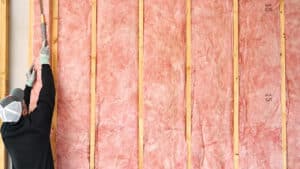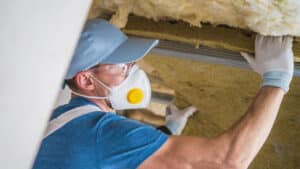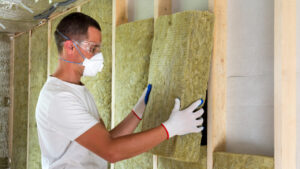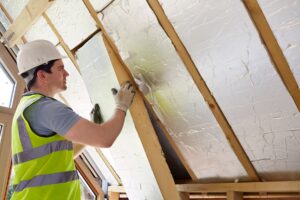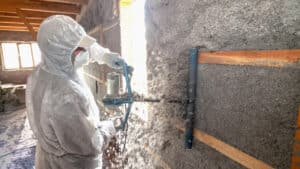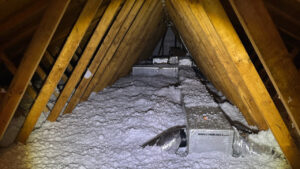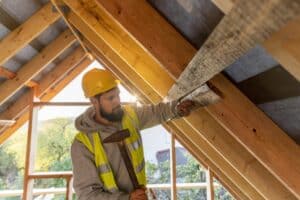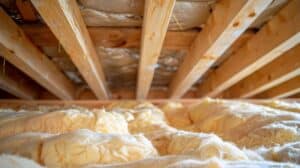Just like a warm blanket on a chilly night, insulation wraps your home, safeguarding it against the elements and keeping those energy bills at bay.
It’s the silent hero nestled within walls and crawl spaces, helping you to maintain comfort and enhance energy efficiency.
Insulation is more than just filling spaces; it’s a strategic approach to protect your living space from heat loss, moisture, and the whispers of high utility costs.
In this article, we will be discussing insulation’s importance, materials, and the undeniable benefits it brings to your home.
What Insulation Does
Explaining how insulation regulates temperature involves delving into fundamental principles of thermodynamics. Essentially, heat naturally moves towards cooler areas, and this principle is crucial to understanding insulation’s role in temperature control.
In warmer months, heat strives to infiltrate your home, while in winter, it seeks to escape. The key function of insulation, regardless of its type, is to impede the flow of heat in and out of a building.
Acting as a barrier, insulation slows down the transfer of heat energy between spaces. By limiting the exchange of air, insulation reduces the workload on your climate control system.
A helpful analogy is to envision home insulation as akin to a beverage koozie. Similar to how a koozie keeps cold drinks refreshingly cool and hot drinks comfortably warm, insulation acts as a protective layer against external temperature influences, helping your home maintain a more stable and comfortable climate, while also easing the strain on your heating and cooling systems.
Understanding Different Insulation Materials and its usage in home insulation
Choosing the right insulation material is pivotal in attaining optimal energy efficiency for your home: Fiberglass, cellulose, and spray foam are common options, each with its unique properties. By understanding their differences, you make informed decisions that significantly affect your energy bills and comfort levels.
| Material | Pros | Cons | Best Use |
|---|---|---|---|
| Fiberglass | Cost-effective, Non-flammable | Can irritate skin/lungs | Attics, Walls |
| Cellulose | Eco-friendly, Good sound insulation | Can settle over time | Enclosed spaces, Obstructed areas |
| Spray Foam | Excellent air sealing, High R-value | More expensive | Gaps, Cracks, Openings |
When considering fiberglass, its widespread use owes to its affordability and ease of installation. However, it’s crucial to ensure proper handling to avoid irritation or health risks. Fiberglass insulation is well-suited to broad, open areas like attics and wall cavities, offering good thermal and acoustic properties. It comes in a wide range of thicknesses which impact how well it insulates. These levels are called “R-Value.”
Cellulose insulation, largely composed of recycled paper, presents an eco-conscious choice and provides admirable sound dampening. Keep in mind, it may need additional treatment to enhance fire and pest resistance, and it’s important to consider its potential to settle over time, which might reduce its insulative effectiveness.
Spray foam stands out due to its superior air sealing capabilities, filling every nook and crevice to create an impenetrable barrier against heat flow. Despite its higher upfront cost, it can offer long-term savings by cutting down on both heating and cooling expenses, especially in irregularly shaped or hard-to-reach areas.
The Science Behind Insulation
As you explore the science behind insulation, consider the three mechanisms of heat transfer: conduction, convection, and radiation. Insulation interrupts conduction, the process by which heat moves through materials, thus keeping your home’s internal temperature stable without overtaxing heating or cooling systems.
It’s essential to realize that the effectiveness of your home’s insulation directly influences your comfort and your utility bill. By acting as a barrier against convective heat transfer—where heat is carried by moving air—insulation ensures that your hard-earned money isn’t just drifting out through poorly sealed spaces.
Radiant barriers are another form of insulation tailored to reflect heat rather than absorb it, an aspect crucial for reducing cooling costs in warmer climates. These barriers, often used in attics, reflect radiant heat away from your living space, keeping it significantly cooler during hot spells.
Total insulation performance hinges on proper installation, as gaps or compression can significantly undermine its thermal resistance. Your choice of an experienced insulation contractor is vital, ensuring that the meticulous work of installation or upgrades to your home insulation results in maximum energy efficiency and savings.
Benefits of Insulation
As you care for your home, insulation brings a world of positive changes. It’s not just about keeping a comfortable temperature; it’s like having a superhero that improves every part of your daily life.
Insulation makes your home cozier by controlling the temperature and reducing noise. It’s like a silent protector, ensuring peace, quiet, and warmth.
But it doesn’t stop there. Insulation also helps the environment by making your home more energy-efficient, reducing your impact on the planet. So, by embracing insulation, you’re not just taking care of your home; you’re playing a role in caring for the environment too.
Improved Comfort
Your home is your sanctuary and the installation of quality insulation enhances that notion significantly. With proper home insulation, you’ll notice a remarkable difference in the thermal comfort of your space, where temperatures remain stable irrespective of the weather’s whims: no more unwelcome chills during winter or oppressive heat in the summer.
Enjoy the tranquility of a consistent and comfortable home environment. By optimizing your insulation, you create a buffer against external temperature fluctuations, ensuring that your living space is a haven of comfort, day in and day out.
1. Consistent temperatures provide a more pleasant living environment.
2. A reduction in drafts and cold spots enhances overall comfort.
3. Insulation contributes to maintaining a quiet and peaceful home by dampening sounds from outside.
Noise Reduction
Embracing the peace that comes with reduced noise levels is a vital benefit of quality insulation. Your home should be a retreat from the constant hum of the outside world, and proper insulation buffers against intrusive sounds by decreasing noise transmission through walls and ceilings.
Imagine the solitude of a sound dampened bedroom or the undisturbed focus in your home office; insulation materials are engineered for just this purpose. They turn the volume down on your neighborhood’s noise, allowing you to enjoy the quietude you deserve.
| Insulation Type | Noise Reduction Coefficient (NRC) | Applications |
|---|---|---|
| Fiberglass | 0.50 - 1.15 | Wall cavities, Ceilings |
| Cellulose | 0.70 - 0.90 | Enclosed spaces, Floors |
| Spray Foam | 0.75 - 1.00 | Cracks, Gaps |
A Smaller Carbon Footprint
By choosing to update or install high-quality insulation in your home, you’re taking a significant step toward reducing your carbon footprint. The energy saved by mitigating heat loss directly translates to fewer greenhouse gas emissions from your heating and cooling systems.
The collective impact when communities embrace energy conservation through effective insulation is profound: reduced reliance on fossil fuels and a meaningful contribution to combating climate change:
1. Energy-efficient homes lower the overall demand for energy production.
2. Less combustion of fossil fuels means fewer emissions and a cleaner environment.
3. Each insulated home is a building block toward a more sustainable future.
Quick Tips for Insulating Your Home
When it comes to making your home more efficient, every layer of protection matters for comfort and value. Paying attention to the details that shield your living space from external weather is key.
Start by reinforcing your attic to withstand the elements, ensuring it’s well-insulated. Protect your pipes from extreme temperatures to prevent issues. Upgrade your windows to do more than just let in light—make them energy-efficient.
These simple steps may seem small, but they have a significant impact on your home’s energy use and, ultimately, your wallet. Taking care of these details goes a long way in creating a more comfortable and cost-effective living space.
Keep Your Attic Insulated
Ensuring your attic is well-insulated is a vital step in maximizing your home’s energy efficiency. Adequate attic insulation will maintain temperatures, prevent heat loss in winter, and keep your home cooler during the hot summer months, which can lead to significant savings on your energy bill.
Invest in high-quality attic insulation to avoid heat seeping through your roof. Not only does this bolster your home’s thermal integrity, but it also reduces the burden on your heating and cooling system, thereby extending its lifespan and optimizing your home’s overall energy consumption.
Insulate Your Pipes
Shielding your pipes with insulation is a key move in your overall home maintenance strategy. It minimizes heat loss from hot water pipes and prevents freezing in the colder ones, delivering both efficiency and peace of mind.
Consider wrapping exposed pipes with quality insulating material to alleviate the strain on your water heater. This simple act not only conserves energy but also ensures you have immediate access to the hot water you need without unnecessary delay or waste.
Install Window Treatments
Transforming your windows into allies in energy saving is critical. Insulating window treatments can significantly diminish heat gain during summer and heat loss in the winter, tipping the scales in favor of your utility bill and comfort:
1. Opt for thermal drapes or cellular shades that trap air and create an insulating layer.
2. Invest in dual shades with a reflective side and a heat-absorbing side for year-round benefits.
3. Consider installing shutters and storm windows to add an extra barrier against temperature extremes.
Diligence in selecting the right window treatments pays dividends in climate control within your home. By simply adding these features, you take a proactive step towards enhancing energy efficiency and achieving a controlled, comfortable living environment.
Insulate Your Home with Universal Insulation Doctor
As your journey towards a more energy-efficient home unfolds, remember that insulating your living space serves a crucial dual purpose: it preserves the comfort within and reduces your energy consumption. Universal Insulation Doctor specializes in turning your insulation goals into reality, ensuring that your home becomes a bastion of energy conservation.
From crawl space to attic, every insulation project we tackle is done with meticulous care and precision. Whether you’re dealing with drafty rooms or high energy costs, know that superior insulation is the key to resolving these issues:
1. Unlock potential savings on utility bills through targeted insulation upgrades.
2. Enhance the comfort and energy efficiency of your home with expert solutions.
3. Contribute to a healthier planet by minimizing energy usage and carbon emissions.
Universal Insulation Doctor empowers you to take control of your energy usage, providing insulation services that pave the way for long-term savings and environmental stewardship. Experience the benefits of a well-insulated home that supports both your financial and ecological aspirations.
Give us a call today to schedule your next-day service!
Frequently Asked Questions
How Home Insulation works?
Insulation conserves home energy by trapping air that reduces heat flow, which in turn keeps your living space warmer in winter and cooler in summer. This resistance to temperature change minimizes the need for heating and cooling systems to work overtime, thereby saving on energy bills.
What are the different types of insulation materials and their benefits for home insulation?
Insulation materials come in a variety of forms, each with unique advantages tailored to your home's insulation needs. Distinct materials -- such as fiberglass, cellulose, and spray foam -- offer different benefits in terms of energy efficiency, cost-effectiveness, and ease of installation.
- Fiberglass Insulation: Commonly found in batt and roll format, it provides a cost-effective solution and is suitable for DIY projects; however, it requires protective gear when installing due to irritants.
- Cellulose Insulation: Made from recycled paper products, this is an eco-friendly option that boasts good fire resistance and can be densely packed to limit air flow.
- Spray Foam Insulation: Creates a thorough air barrier and is exceptional for sealing gaps, but it is typically more expensive and requires professional installation.
- Foam Board Insulation: Composed of rigid panels and used for insulating almost any part of your home, from the roof down to the foundation, it's excellent for reducing heat conduction.
- Reflective or Radiant Barrier Insulation: Ideal for reducing cooling costs in hot climates by reflecting heat away from your property.
Each type of insulation addresses unique challenges like heat flow, noise reduction, and controlling energy costs, making your home more comfortable and efficient.
Can insulating my home help lower my energy costs?
Absolutely, insulating your home is a proven method to reduce your energy expenses significantly. By creating a more consistent internal temperature, insulation diminishes the demand on your heating and cooling systems.
What are some quick and easy tips for insulating my home?
To efficiently insulate your home, start by sealing air leaks around windows and doors with weather stripping or caulk; this simple step can prevent heat flow and energy loss. Moreover, adding insulation to your attic and crawl spaces contributes significantly to maintaining your home's temperature, ensuring both warmth in winter and coolness in summer.
How can Universal Insulation Doctor help me with my home insulation needs in Virginia beach and surrounding areas?
Universal Insulation Doctor specializes in providing personalized insulation services that tackle everything from moisture damage in your crawl space to enhancing energy efficiency throughout your Hampton Roads home. With expertise in the latest insulation materials and techniques, they ensure your space is protected, comfortable, and cost-effective.

